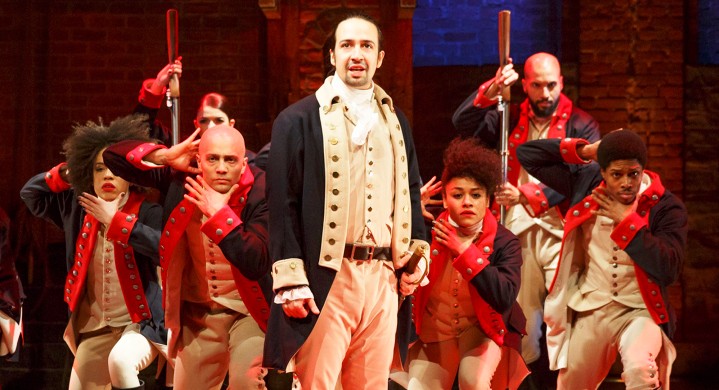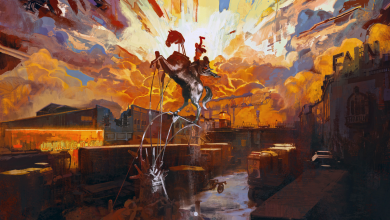“Hamilton,” Lin-Manuel Miranda, and the Politics of Making History

Image: “HAMILTON – Public Theater/Newman Theater” taken by Joan Marcus, is copyright © 2015 and is made available under the Attribution-Share Alike 4.0 International license.
I never thought that I would be begging my friends to listen to a rap battle between Alexander Hamilton and Thomas Jefferson, but life does not always take us down a road we expect.
Something in the story of the United States’ first Secretary of the Treasury sparked playwright Lin-Manuel Miranda’s imagination, and now he has shared that flame with the rest of the world. His product is “Hamilton: An American Musical,” which highlights the spirit of what this country should stand for, and has been breaking records and changing the game with musical theater.
The musical follows the life of Alexander Hamilton through the American Revolution and the first three United States presidencies until his death in 1804. Musically, it consists of rap and hip hop performed by an incredible cast in which every main character—except for King George III of England—is played by a person of color. The choice to cast some of the most well known figures in US history, such as George Washington and Thomas Jefferson, as black men was deliberate. This offers the opportunity for people of color to claim a history and feel more connected with the country that for centuries has not reflected them.
But the show does not glorify the people or the stories it tells. It has its modern audiences in mind while staying true to source material. It paints the Founding Fathers in a human light that emphasizes their flaws and conflicts with each other. They did not all get along ceremoniously, and though depicted as larger-than-life in society today, they were not all good people. James Madison (played by Okieriete Onaodowan in the Original Broadway Cast) is timid and hides behind Jefferson for much of the show’s second act. Alexander Hamilton and Thomas Jefferson get into fights that sometimes comedically resemble petty fights of children, (“Sir, I don’t know what you’ve heard, but whatever it is, Jefferson started it” Alexander tells George Washington in “One Last Time”).
Thomas Jefferson himself is an antagonist in the show. He is cocky, arrogant, prideful, and irresponsible in his work. When he enters in Act 2 (originally played by Daveed Diggs), he enters the stage singing pridefully about America’s freedom while ordering his slaves around. And Alexander calls him out on his hypocrisy during a cabinet meeting, mockingly saying “Your debts are paid because you don’t pay for labor…keep ranting, we know who’s really doing the planting.”
The show keeps up a strong theme of anti-slavery ideas, with Alexander and close friend John Laurens (originated by Anthony Ramos) speaking out against slavery. “We’ll never be truly free until those in bondage have the same rights as you and me,” Laurens sings, adamant throughout the show about ending slavery. The show also discusses a part of the Revolution not taught in school—the role of black soldiers in the war. Their involvement is a constant in the musical’s depiction of the Revolutionary War, and in one of the final battles of the war, Laurens narrates “Black and white soldiers wonder alike if this really means freedom.”
Another political message in the show—which is especially important in the modern United States’ political climate—is the celebration of immigrants and their importance to the country. Miranda himself is outspoken about his pro-immigration beliefs, and has a personal stance in it, as both his parents were immigrants from Puerto Rico. Alexander Hamilton had a difficult childhood in the Caribbean, causing him to search for every opportunity to go to the United States and make a better life for himself. His story of clawing for every scrap he got is courageous, to say the least. And it is not inaccessible or rare. He’s “another immigrant coming up from the bottom,” the show says, and he’s not the only one. In a joyful moment during the first act, Alexander and Marquis de Lafayette share their accomplishments and high-five, saying “Immigrants—we get the job done!” getting cheers night after night during performances.
The show also acts as a call to action with the contrasting of Alexander and Aaron Burr’s characters. Much of the show is narrated by Aaron Burr (played by Leslie Odom Jr.)- the man who killed Alexander. Burr repeatedly says throughout the show “Talk less. Smile more. Don’t let them know what you’re against or what you’re for.” He vaguely refers to stances he has, while advising caution and never publicly states his opinions. He waits to see what the majority will favor and then later joins that position. He is shown to be ambitious, running for president against Thomas Jefferson in 1800, but never reveals his own beliefs. Alexander scolds Burr throughout the show, asking “If you stand for nothing, Burr, what’ll you fall for?”
In this, Burr comes to represent respectability politics, the idea of not challenging mainstream ideas, especially in oppressed groups (both Burr and Alexander were poor orphans). Alexander, on the other hand, constantly challenged ideas he disagreed with and never seemed to stop talking, writing, and working towards his goals. The show asks repeatedly of Alexander “Why do you write like you’re running out of time?” because he wrote volume after volume of political pamphlet and letter. If Burr represents respectability politics, Alexander represents activism, and the value of taking a stand for what you believe in.
Many characters in the play are outspoken and were hugely influential, but history hardly remembers them. “Hamilton” sings of the other often unsung heroes of the time—women. The two women central to the story are Angelica Schuyler and Eliza Schuyler Hamilton (played by Renée Elise Goldsberry and Phillipa Soo). Neither women are reduced to shallow characters, and their physical descriptions are never stated directly in the show. The physical descriptions of male characters are sometimes given, but with the women their personalities are most important. Even though they are the objects of male characters’ affections, there are never negative comments made about or towards them. This is especially important because women (fictional and real) are often judged solely on their adherence to specific standards of beauty.
Angelica is confident, smart, loving, and ultimately selfless. She knows who she is—“the oldest and the wittiest”—and is aware of her place in the world. Knowing she is a woman, and that this is a world in which her “only job is to marry rich,” Angelica is not satisfied, quoting the very words of the Declaration of Independence in her argument:
“I’ve been reading ‘Common Sense’ by Thomas Paine
Some men say that I’m in intense or I’m insane
You want a revolution? I want a revelation
So listen to my declaration:
‘We hold these truths to be self-evident
that all men are created equal
And when I meet Thomas Jefferson
I’m ‘a compel him to include women in the sequel!”
(from the song “The Schuyler Sisters”)
She is passionate in everything she does. And through everything that happens in the show, she always chooses her sister and her happiness above everything else, displaying true love and loyalty. While both sisters fell in love with Alexander, Angelica gives him up for her sister’s happiness.
Eliza is more gentle and optimistic than Angelica, but just as passionate. Whereas Angelica sings about how she will “never be satisfied” and is a realist, Eliza is hopeful and grateful. One of her musical themes is “Look around, look around, at how lucky we are to be alive right now.” She is supportive, trusting and kind, being content as Alexander’s wife even when they are poor. Throughout her life, Eliza has a quiet strength, enduring her husband’s infidelity, her son’s death, and her husband’s death.
The idea of legacy and how people are remembered is a main topic in this show, saying that history is always watching, but you personally “have no control who lives, who dies, who tells your story.” Eliza speaks of the narrative that Alexander will be a part of, since he plays such a huge role in the building of the nation. At one point she begs him to let her be a part of it, as being with him and supporting him. But upon later learning that Alexander cheated on her and exposed it to the public, she takes control over her emotions and her life in the only way she can, since so much is out of her control: she erases herself from the narrative. In her solo, “Burn,” she sings with a soft voice that grows with anger and grief, burning her letters from Alexander. It’s the only act of rebellion available to her: choosing what is remembered, and demanding her own privacy.
Finally, after Alexander’s death, Eliza narrates the conclusion of the play, entering with “I put myself back in the narrative.” It was a personal choice of selflessness over her own broken heart to make sure her husband was remembered for his role in building the nation. She describes how she lived fifty years after Alexander’s death, compiling every bit of history of his life that she could, speaking out against slavery, and opening an orphanage in his name. All of it was so that he could be remembered, not her. The entire play’s story would not be possible without the heroic efforts of Eliza Hamilton. In this, the show’s name is likely not just a reference to Alexander, but Eliza, too.
Lin-Manuel Miranda did not anticipate his game-changing musical when he sat down to read a lengthy biography of a Founding Father, but as “Hamilton” itself says, legacy is “planting seeds in a garden you never get to see.” We never get to know what mark we will leave until it is there. But with its cast composed of people of color, its political stances, and narrative about those who are so rarely remembered, this show is exactly what the modern United States needs. It is not just a retelling of history, but it makes history accessible. It inspires and calls its audiences to action, telling its audiences that America is “a great unfinished symphony” that people of color, immigrants, the poor, and women all have an integral part in building.




